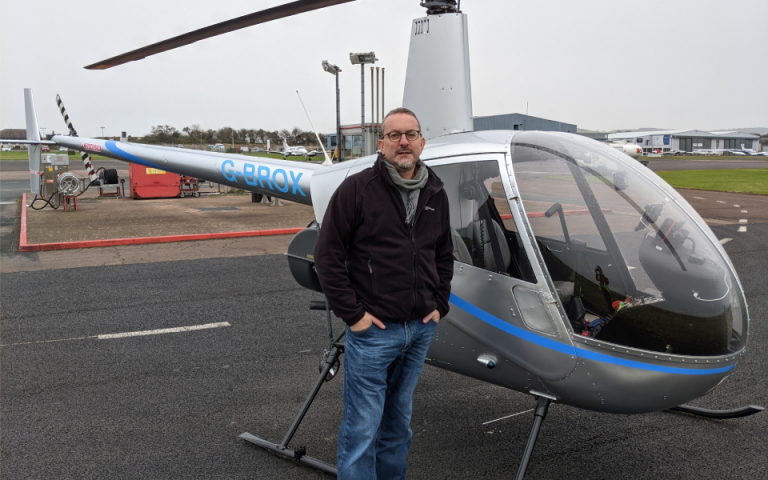Dr Richard Osborne
Dr Richard Osborne is the Faculty Learning Technology Lead who joined UCL in August 2020.

1 February 2022
What did you do before joining UCL?
I was at the University of Exeter for many years, where I worked as an Education Advisor in a similar role to this one, helping academics understand how to use digital technologies effectively.
After gaining my PhD in 2015 I decided it was time for a change, and moved into secondary education, first training and working as a physics teacher and later as an education consultant, helping schools align pedagogy and technology.
Tell us about your work at UCL - how do you spend your days, and what makes your role different to similar positions elsewhere?
I often think of my role as three things – connecting, aligning and reflecting. The purpose of my role is to advise academic colleagues on how digital technologies can be used effectively within teaching and learning. A lot of that is about connecting what Digital Education, Arena and other departments across UCL provide with the needs of colleagues in the faculty.
On a practical level that means proactively suggesting specific tools and technologies to colleagues, but also responding to their requests, whether for short term answers or longer-term projects.
It’s also about aligning local needs with central provision. In many cases that means subtly rewriting or reworking what has been produced centrally so that it is more in tune with what we need as a faculty, for example, running bespoke workshops on key topics tailored for individual departments.
Finally, it’s about reflecting, which in practice means understanding how things are done locally and making sure that central teams are aware of the issues we face, and, if necessary, pushing back to the centre so that core services suit us better, and even bringing in new services that are more attuned to what we need.
I manage a lot of this through the MAPS Faculty Learning Technology Hub, a Microsoft Teams space. Do please join it, we have over one hundred members who use it to discuss all things technological and pedagogical.
What are some of your favourite things about working in the department? How have you found it different to previous jobs?
Three things have really struck me about working for UCL – the warmth of the welcome, the diversity of the workforce and the incredible talent of my colleagues. Having joined UCL during the pandemic I’ve had little chance to get to know people face-to-face, but nonetheless everyone has been very welcoming and made me feel part of the team right from day one.
I’ve been equally impressed by the diversity of the institution in terms of people and practices. Living where I do in the countryside things are perhaps a little too comfortable and traditional, but it’s become clear UCL has a really strong, tolerant and inclusive community which I’m proud to be a member of and feel inspired by.
Finally, it’s been an absolute pleasure getting to know lots of interesting and talented individuals, across both professional services and our many academic departments. I’ve been particularly impressed by the way UCL has dealt with the challenges of the pandemic, and the robustness and clarity of the guidance that has been created – makes my job a lot easier!
Can you tell us about any future projects that you're looking forward to working on?
With my background in educational research, I’m keen on exploring what we can do next in terms of using digital technologies to enhance teaching and learning across the faculty. I feel we’re reaching a good place now in terms of how colleagues have adapted their teaching to a more blended style, achieving in a matter of months what many in my line of work have been advocating for years.
Whilst there is still work to be done in honing the blended by design approach, there’s also exciting work to be explored in how digital technologies can catalyse learning in specific contexts, for example, using mixed reality and simulation technologies.
What has originally brought you to London and why did you move?
I grew up in Essex, so London was always a short hop away from me up the central line, and I moved there permanently when I became an undergraduate at UCL, first in Electrical & Electronic Engineering and then in Psychology.
Eventually I decided to leave city life and moved to the countryside, never imaging that I would work for a London based company again. However, now that I’m back at UCL as a member of staff I use my expertise in digital technologies to connect with colleagues just as easily as if I was campus based – if not more so. That said, I’ve enjoyed my trips to campus so far and am certainly looking forward to more of them.
Finally, tell us about your non-work life. Do you have any hobbies? How do you spend your time off-work?
My family and I love a walk in the woods, and I’ve taught myself how to forage for wild mushrooms over the years which is a fun hobby, not to mention a healthy way of finding free food! One word of advice, though, always work out which the deadly ones are first.
I’ve also been learning (slowly!) how to fly a helicopter, a longstanding interest which dates to my time as a student at UCL, when I was sponsored through University by Westland Helicopters.
My partner is from the Italian alps, and she’s recently convinced me to learn to ski so that our young son can learn – something which he has taken to very quickly, but I must admit I still struggle sometimes!
 Close
Close

